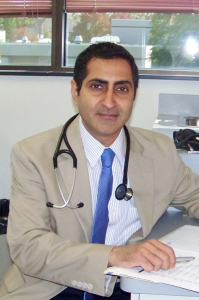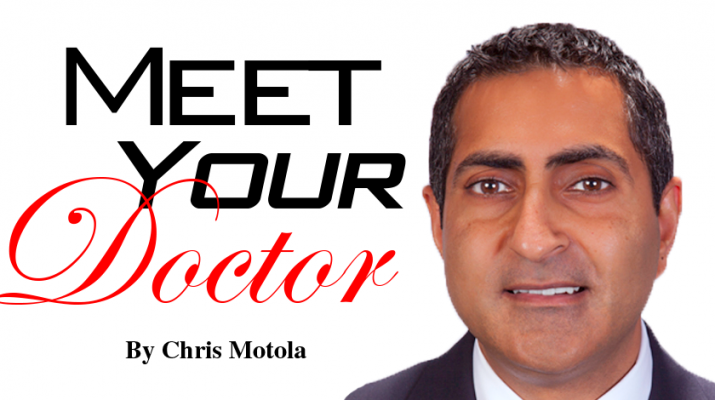For new president of Monroe County Medical Society, one of the challenges is to retain and attract new physicians to the area
By Chris Motola
 Q: What got you interested in heading the Monroe County Medical Society?
Q: What got you interested in heading the Monroe County Medical Society?
A: I’ve been involved in the society as a member since 2005. They have a lot of local programs that make you aware of the offerings that they have. I was approached by the previous executive director, Nancy Adams, and exposed to a lot of the inner workings of the society. It sounded quite interesting, so she asked me to throw my hat in the ring. I started serving on some of the committees and boards. We do quite a bit of advocacy on the local and state level for providers and patients in the area. It allows us to have an impact beyond local healthcare delivery. So that was the main thing.
Q: What challenges do you see in healthcare in Monroe County?
A: Our main goal, of course, is patient care and delivering good quality healthcare to patients. The area’s being challenged by physician loss due to unfavorable practicing climate. It’s not particularly attractive in terms of weather, but the quality of our healthcare system is excellent. We have infrastructure in place and a lot of great providers, but the challenge is keeping them here. The key to that is helping them practice efficiently and in a happy fashion, if you will. And recruiting new folks as well. Part and parcel to that are reimbursement challenges and expenses of practices, many of which are decisions made at the state level.
Q: What can the medical society directly address?
A: A lot of things are out of our control. We can’t control Medicare rules and reimbursement, but we do have some input at the state level politically. We also have close contact with insurers and the hospital systems, so we’re something of a conduit for all these groups to sit at the same table. That’s really our biggest aspect.
Q: What topic interests you most personally?
A: There were a couple topics that were brought forth last year: physician wellness and the opioid epidemic. In terms of physician burnout, we’re looking at the aspects of practice that are bothersome to physicians. Some of those are regulatory burdens imposed by the state. Reducing preauthorization burden from insurance companies is an aspect we’d like to focus on. There’s always the pipe dream of reducing drug costs, but that’s probably best dealt with on the state and federal level, but that’s always an uphill struggle. We try the best we can locally through pharmacy benefit programs.
Q: How do those programs work?
A: Some of the proposals that were placed included mandating that pharmacies disclose cheaper alternative drugs when available, or generics. We want to promote that as much as we can since the newest and latest isn’t always the best option. Or even if its clinical efficacy is a percentage or two better, that gain may not be worth paying triple the cost. But getting pharmacists and benefit managers to expose alternative medications will be key.
Q: To what degree can you affect reimbursement rates at the county level?
A: There’s always downward pressure on reimbursement rates. The reimbursements come from either governmental or private insurance. Bringing solid jobs and wages to the area is an important strategy for private insurance. Medicare rates are pretty fixed at the federal level, but regionally there are some Medicaid programs that look at patient-centered home programs to coordinate care and reduce costs, but they’ve been pulled back once the budgetary constraints were reached this year.
Q: Are you still practicing full-time?
A: Usually the role of president is a volunteer one, so we usually retain our practices. I’m a gastroenterologist. I’m still in my first job! I like what I do.
Q: You’re originally from the U.K., but I don’t hear an accent.
A: I was born in a town called Dudley in the West Midlands. It’s working class, old mining country in the middle of England. My father’s work took us to South America, to Venezuela for a few years. I picked up speaking Spanish there. Then we moved back to the U.K. Then I moved to the U.S. for school, first to Iowa, then to Syracuse. I’ve moved around a lot, so I kind of have the accent from the private schools I went to growing up.
Lifelines
Name: Surinder S. Devgun, M.D.
Position: President of Monroe County Medical Society; gastroenterologist with Rochester Gastroenterology Associates.
Hometown: Dudley, West Midlands, UK
Education: Completed his undergraduate education in electrical engineering with honors from Iowa State University.
Graduated from SUNY Upstate Medical Center in Syracuse and completed general internal medicine training as well as advanced training in GI motility and small bowel transplant at the University of Pittsburgh Medical Center.
Volunteer work: Volunteers as teaching faculty at Unity Health System’s medicine residency program as well as an attending
Affiliations: Rochester Regional Health; gastroenterologist at Unity and Rochester General Hospital. Established the EUS (endoscopic ultrasound) program at Unity Hospital in 2006. Clinical interests focus on general gastroenterology, pancreatobiliary diseases as well as inflammatory bowel disease
Organizations: Monroe County Medical Society, American Gastroenterology Association, American College of Gastroenterology
Family: Wife, two sons, one daughter
Hobbies: Travel, time with family, biking, skiing

